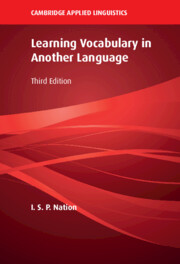Book contents
- Learning Vocabulary in Another Language
- The Cambridge Applied Linguistics Series
- Learning Vocabulary in Another Language
- Copyright page
- Contents
- List of figures
- List of tables
- Acknowledgements
- Introduction
- 1 The goals of vocabulary learning
- 2 Knowing a word
- 3 Teaching vocabulary and the roles of the teacher
- 4 Vocabulary and listening and speaking
- 5 Vocabulary and reading and writing
- 6 Learning vocabulary out of class
- 7 Vocabulary in specialised areas
- 8 Vocabulary-learning strategies and autonomy
- 9 Learning words from context
- 10 Word parts
- 11 Deliberate vocabulary learning from word cards
- 12 Finding and learning multiword units
- 13 Testing vocabulary knowledge and use
- 14 Designing the vocabulary component of a language course
- Book part
- References
- Author index
- Subject index
8 - Vocabulary-learning strategies and autonomy
Published online by Cambridge University Press: 02 June 2022
- Learning Vocabulary in Another Language
- The Cambridge Applied Linguistics Series
- Learning Vocabulary in Another Language
- Copyright page
- Contents
- List of figures
- List of tables
- Acknowledgements
- Introduction
- 1 The goals of vocabulary learning
- 2 Knowing a word
- 3 Teaching vocabulary and the roles of the teacher
- 4 Vocabulary and listening and speaking
- 5 Vocabulary and reading and writing
- 6 Learning vocabulary out of class
- 7 Vocabulary in specialised areas
- 8 Vocabulary-learning strategies and autonomy
- 9 Learning words from context
- 10 Word parts
- 11 Deliberate vocabulary learning from word cards
- 12 Finding and learning multiword units
- 13 Testing vocabulary knowledge and use
- 14 Designing the vocabulary component of a language course
- Book part
- References
- Author index
- Subject index
Summary
Vocabulary-learning strategies are not only a means to improving the quality of vocabulary learning, but are a part of encouraging learners to take control of their own learning. That is, to become autonomous learners. It is useful to distinguish between knowledge of vocabulary strategies and the ability to use strategies. To be truly useful, a strategy needs to be practised until it is very easy to use. However, knowledge of the principles of learning that lie behind strategies is also important, because this knowledge allows learners to look critically at their own learning and to reflect on ways to improve it. A good language course should introduce learners to the most important principles of learning and should inform them of ways in which they can improve their language learning both inside and outside of the classroom. A good language course book should also include this information, and in this chapter, we will look at how this can be done. Strategies can involve choosing what to focus on and when to focus on it, finding information about words, establishing knowledge, and enriching knowledge.
Keywords
- Type
- Chapter
- Information
- Learning Vocabulary in Another Language , pp. 316 - 335Publisher: Cambridge University PressPrint publication year: 2022



